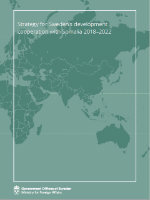Strategy for Sweden’s development cooperation with Somalia 2018–2022 Reference No.: UD2018/10786/AF
Published

The objective of Sweden’s international development cooperation is to create
opportunities for people who live in poverty and oppression to improve their living conditions. Development cooperation will be based on the principles of aid and development effectiveness, and the new agreements reached by the international community in 2015: the 2030 Agenda, the Addis Ababa Action Agenda and the Paris Agreement.
Download:
Within the framework of this strategy, Sweden’s development cooperation with Somalia will contribute to sustainable peace, strengthened resilience to crises and disasters, greater respect for human rights, gender equality, and environmentally and climate-resilient sustainable development. The strategy applies during the period 2018–2022 and provides a total of SEK 3 030 million, of which SEK 3 000 million is intended for activities implemented by the Swedish International Development Cooperation Agency (Sida) and SEK 30 million is intended for activities implemented by the Folke Bernadotte Academy (FBA).
Sida’s activities will contribute to the following objectives:
Peaceful and inclusive societies
- Improved opportunities for participation in peacebuilding and statebuilding processes, particularly by women and young people.
- Strengthened capacity to implement sustainable and inclusive security sector reform.
- Strengthened capacity to prevent and counter violent extremism and radicalisation.
- Improved conditions for inclusive and sustainable economic growth.
The FBA’s activities will contribute to objectives 1 and 2 in this area.
Human rights, democracy and the rule of law
- Strengthened systems and institutions that promote and guarantee respect for human rights, democracy and the rule of law.
- Increased participation and influence in democratic processes, particularly by women and young people.
- Strengthened institutional capacity to provide basic community services and accountability.
Resilience, environment, climate change and energy
- Increased food security, and sustainable use and management of natural resources, focusing on agriculture, water and oceans.
- Greater access to renewable energy and improved energy efficiency.
- Greater resilience and adaptation to climate change and strengthened capacity to mitigate natural disasters, and reduce environmental degradation and environmental risk.
Equitable health, focusing on sexual and reproductive health and rights
- Greater and equitable access to health and medical care, focusing on women and children.
- Greater access to and respect for sexual and reproductive health
and rights.

 X
X